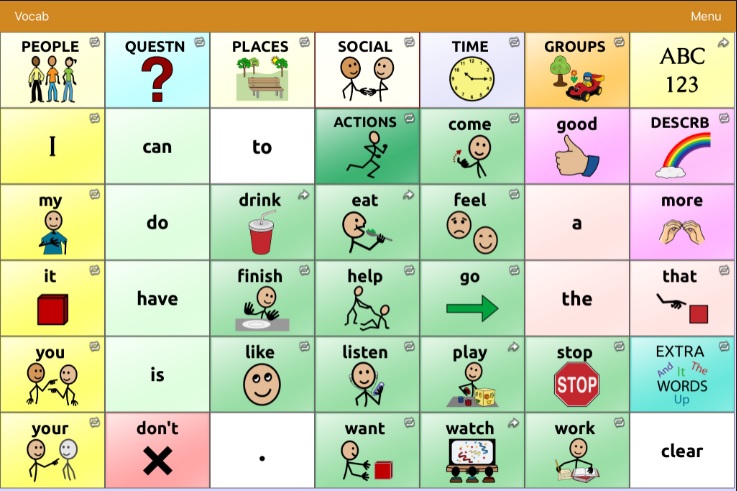

#Touchchat vs touchchat with wordpower full#
Many users with ASD who have this type of AAC system request or mand for preferred food or toys with a full sentence such as “I want to eat cookie.” (See images below). Individuals with ASD are prone to perseveration and providing this type of AAC system promotes scripting with AAC. To make matters worse, the page-based systems are programmed to stay open on the last page in the sequence: the highly preferred food, drink or toy. Requesting or “manding” scripts produced on phrase-based AAC systems are highly reinforced when the user is given their favorite food, drink or toy. In the example of Jed, he produced I WANT TO DRINK WATER so quickly that his finger moved faster than the neurotypical eye could follow! Individuals with ASD quickly become automatic at producing phrases and sentences that are highly motivating. For instance, if the user selected “I want” then “to eat”, the food page would open. That is, when the user selects the “I want” button, the next page that opens contains high frequency infinitives for requesting such as “to eat,” “to drink” or “to play.” Once the user selects the desired infinitive, the final page that opens contains fringe vocabulary words that are appropriate to the selected action word. Most page-based systems are set up so that each button automatically navigates the user to the next page using word/phrase/sentence prediction. He regularly produced a number of scripts, but did not use TouchChat to compose novel utterances. He did not shift his gaze to a communication partner, though he was capable of doing so.

However, he then produced the same utterance each time before taking a sip of water. He produced “I want to drink water” appropriately to request water. The child mentioned above, Jed, who produces “I want itchie owie cream” was given an iPad with TouchChat with Word Power. However, these systems encourage scripting. Many of these individuals are given phrase-based AAC systems such as TouchChat or Proloquo2Go. Speech language pathologists (SLPs) are beginning to recognize that individuals who speak but are mainly scripting, do indeed have a need for AAC. Clearly his speech is not meeting his communication needs. The same child also requests “I want glue stick please” when he requires assistance or materials during any craft activity, even when a glue stick is not needed. He is not able to produce any other words to describe his symptoms or direct his care. Now the child uses this term when he’s too hot, not feeling well, or has an injury. She referred to it as “itchie owie” cream. He learned this script when he had a mosquito bite and his mom put cream on the bite. But it’s not appropriate for an adult.Īnother child scripts, “I want itchie owie cream” whenever he experiences pain or discomfort of any sort. In the example outlined above, saying “There there” to offer sympathy is acceptable if a child hurts him or herself. A script is useful to meet one’s communication needs only in a constrained pragmatic context. However, scripting is a far cry from novel utterance generation. Initially, the productions sounded bizarre and out of context, but as she matured, she began to use the scripts in appropriate pragmatic settings. Another little girl used scripts from Dora the Explorer. For instance, a child cut her finger and cried, her mom patted her on the shoulder and said “There there.” Now, whenever anyone is crying or sad, the child says “There there.” Scripting is beneficial for many individuals with ASD as it helps them to learn language. Other times the script has been memorized in a specific pragmatic context.
#Touchchat vs touchchat with wordpower tv#
Sometimes this scripting is based on a character from a TV show or movie. Many individuals with ASD “script.” That is, they may not produce novel utterances, but rather chunks of phrases and sometimes entire sentences they have memorized. We have begun to provide word-based AAC systems for these students to move beyond scripting.

A vast number of learners with ASD can speak, but their speech is not functional to meet their communication needs. I am the Director of Speech, Language and AAC Services at an ABA clinic, so naturally we serve many individuals with Autism Spectrum Disorder (ASD) of all ages. In this post, she discusses how professionals in her organization are supporting AAC learners with autism on the journey toward flexible, generative language. Today, we welcome Dr. Kimberly Ho, SLP and Director of Speech, Language and AAC Services at Confidence Connection in Needham, Massachusetts.


 0 kommentar(er)
0 kommentar(er)
